Share Your Stories
YEAR OF NEWS :

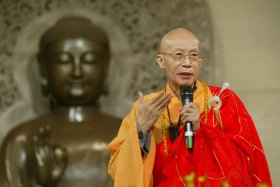
Wednesday, December 24, 2014
The Heart Sutra teaches that suffering comes from ignorance, attachment to self, and confusion caused by afflictions; it also teaches us how to live with purpose, to ultimately fulfill the four great vows and to cultivate a non-abiding mind. But we are stubborn and refuse to give up our afflictions easily, for ignorance and self-attachment are at the roots our perceived existence. Nevertheless, it is through our will and our vows, the wellsprings of action, that we arouse the bodhi-mind , and begin the process of enlightenment. This willingness is crucial, because it is not easy to change our old ways, however destructive or comforting they may be. But the choice, as always, is ours. By following the bodhisattva path to its end, we will ultimately exhaust all ignorance, cross the ocean of suffering, and reach anuttara-samyak-sambodhi. This is the far-reaching and profound message of the Heart Sutra.


The reason I signed up for the gardening retreat was simple curiosity. I always thought that meditation meant sitting on a cushion until your legs are numb and your back is sore! How can you meditate while you are gardening? So I decided to find out!
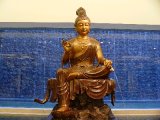
Now let us look at the third dualism: “neither increasing nor decreasing.” Your weight may increase by a few pounds, and you may think it is either good or bad. In our appearance-conscious society, where gaining weight has a bad name, many people try to live up to a conventional image of beauty by working away their fat. If it has no impact on health, what are a few pounds more or less? Every time l return from a trip, people tell me I have lost more weight. If this were true, I would have disappeared by now. This is an example of how increasing and decreasing are relative things in people’s mind.
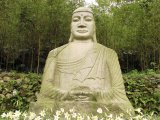
The word Buddha comes from Sanskrit, an ancient Indian language. It means enlightened or awakened: awakened not just oneself but also awakening others; awakening to the knowledge and truth of all things at all times. Thus, a Buddha is sometimes called an omniscient human being or a “fully enlightened one.”

The second dualism-"neither pure nor impure"-refers both to phenomena, and to judgments people make about phenomena. For example, you may choose not to brush your teeth, not to wash, not to change clothes, in which case you may look dirty and smell bad to others. On the other hand, you may clean up, shower, brush your teeth, and change your clothes. Then you will look clean to others. Either way, you are the same person. Some people appear clean most of the time and dirty some of the time; others look dirty most of the time and clean only some of the time. Furthermore, the criteria for cleanliness are not absolute. You may think you are clean while others judge you to be unclean. You may think you are unkempt, but another might find you attractive.
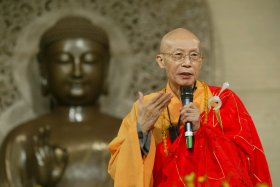
No. Orthodox Buddhism does not have the idea of a world-creator. The Buddha is an enlightened one among humans, and although he is capable of knowing all the truths in the world, he cannot change what has already occurred. And although the Buddha can help all sentient beings reach liberation, only those who make efforts can succeed. He is the best doctor to diagnose sentient beings’ suffering: anybody who takes his prescriptions will be delivered (released from adversity). But he cannot help those who are unwilling to take his medicine. He is the best guide: anyone who follows his guidelines will be liberated from the world’s sea of suffering. But he cannot help those who do not take his advice.

I told a woman whose son had died that the reality is that she had a son, and now he is gone. Her memories of him persist, but he is somewhere else. He may now even be someone else’s child. It would make things easier for her if she considered him her ex-son and move on. She said that it would be very difficult to think along that line. I told her she should nevertheless cultivate it as a method of practice.

Not clinging to either the negative or the positive is correct Buddha dharma. The reason we lose hope when faced with failure, and get overexcited when meeting success, is that we cannot let go of our self importance. Whatever we cannot let go of becomes an obstruction. Buddha dharma espouses being aware of the reality of the moment, then letting it go. A young person is not yet old; an old person is not yet dead. Work with what you have, and do not resist change. Understanding that every moment, your life indeed, the entire universe--is a dynamic process of birth, growth, decline, and death, will help to loosen your attachment to self. In turn, you will be hopeful in facing difficulties, composed when meeting success, and dedicated when fulfilling our obligations.
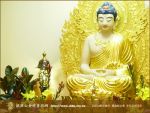
In Buddhism itself, there is no distinction between orthodox and superstitious, since the fundamental teachings are the same everywhere. Buddhism flows out from the sea of wisdom and compassion that was engendered by Sakyamuni, the enlightened Buddha. Its teachings are full of wisdom, kindness, radiance, comfort, freshness, and coolness. Buddhism as a religion is alive in the communities that have been established based on the Buddha’s teachings.

When I first heard about the Meditation Retreat in Centennial Beach from my friend who is a Buddhist, I decided to give it a try. Not only because I like Buddhism but also I was told that meditation can help a person to calm his/her mind.

If you contemplate your mind, you will find no mind, except the mind that comes from mis-conceptions.

PAGE :
1
2
3

|